

MoneySense. Teaching Resources. Topic 6 - What are my consumer rights? Why join a union? On average, union members get higher pay than non-members.
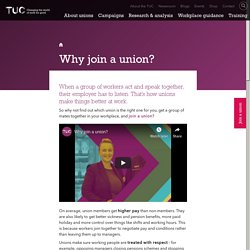
They are also likely to get better sickness and pension benefits, more paid holiday and more control over things like shifts and working hours. This is because workers join together to negotiate pay and conditions rather than leaving them up to managers. Unions make sure working people are treated with respect – for example, opposing managers closing pensions schemes and stopping new workers being employed on worse terms and conditions.
Unions push managers to make workplaces more inclusive for women, LGBT workers, Black and minority ethnic workers, older workers and disabled workers. When there’s a strong trade union, women are far less likely to face problems at work while pregnant, on maternity leave or when they return to work. Workplaces where there are unions are safer workplaces. If you run into problems at work, your union has got your back. Unions help our members get on in life. Isn’t it time you joined a union? - Our Work - Financial Education - Free Resources - Lesson Plans. Teaching resources for KS 4 inc banking, bills, ID fraud, wages, debt. 15 vital money lessons you should have been taught in school. For many of us, school involved too many quadratic equations and not enough practical money management.
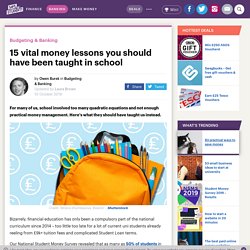
Here's what they should have taught us instead. Bizarrely, financial education has only been a compulsory part of the national curriculum since 2014 – too little too late for a lot of current uni students already reeling from £9k+ tuition fees and complicated Student Loan terms. Our National Student Money Survey revealed that as many as 50% of students in the UK don't understand their Student Loan agreement, and over three quarters have said they didn't get enough financial education in school.
With today's young people facing a tough economic climate, a tricky housing market and student debt, it's more important than ever to swot up on your finance. How to teach ... financial literacy. From this September, financial education will be embedded into the new maths and citizenship curriculum, giving schools the chance to equip young people with the knowledge and skills they need to manage their money.
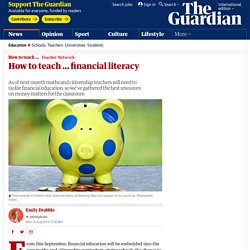
Here's our round up of resources to help teachers tackle financial education with students of all ages. The finance education charity MyBnk has developed a Money Marathon game for secondary school students, which can be used across three 30-minute lessons. It involves an interactive set of quizzes and activities as part of a board game, so you'll need the instructions and dice to play.
There is an excellent PowerPoint quiz that can be used as part of it or as a standalone resource. Packed with jaw-dropping facts, the quiz introduces the concepts of saving, borrowing and interest. Money For Life - Make the most of your money. PSHE KS3 / KS4: Financial Literacy - BBC Teach. Teaching Resources. HM Revenue and Customs (HMRC) has developed Tax Facts as an accessible and free resource, to simplify the teaching of how public money is raised and spent.
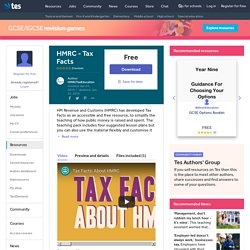
The teaching pack includes four suggested lesson plans but you can also use the material flexibly and customise it to fit your personal teaching style and the amount of time available. Tax Facts is aimed at students in the 14 to 17 year old age group, and can be used to teach students of different ability levels. Each lesson is built around a short animation, which you can view here or on YouTube: Teaching Resources. 'Tax Facts' and 'Junior Tax Facts' published by HM Revenue and Customs. 'Tax Facts', and 'Junior Tax Facts' published by HM Revenue and Customs (HMRC), have been awarded the ACT Quality Mark for Citizenship Teaching Resources.
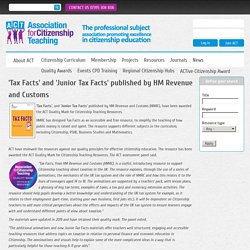
HMRC has designed Tax Facts as an accessible and free resource, to simplify the teaching of how public money is raised and spent. The resource supports different subjects in the curriculum, including Citizenship, PSHE, Business Studies and Mathematics. ACT have reviewed the resources against our quality principles for effective citizenship education. The resource has been awarded the ACT Quality Mark for Citizenship Teaching Resources. The ACT assessment panel said, “Tax Facts, from HM Revenue and Customs (HMRC), is a useful, introductory resource to support Citizenship teaching about taxation in the UK. The materials were updated in 2019 and have retained their quality mark. The animations can be viewed on YouTube or DVD copies can be ordered, free of charge, by emailing HMRC.
Teacher Network. It's been a bad news month for HSBC after The Guardian and other media outlets revealed its private banking arm turned a blind eye to arms dealers' illegal activities and helped wealthy customers evade tax.
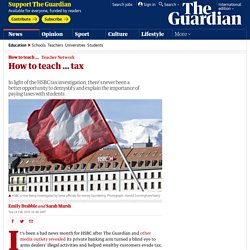
Millions of dollars of assets were concealed, and HSBC is now being investigated by Swiss officials for money laundering. France, Belgium, Spain, the US and Argentina have launched legal proceedings against HSBC and its wealthy private clients. The good news for teachers is that the story provides plenty of opportunity to engage students in lessons about tax – without boring them to tears.
So, this week the Guardian Teacher Network takes a timely look at how to help students understand taxes and why we have to pay them. - Our Work - Financial Education - Free Resources. Interactive Employability Worksheets.